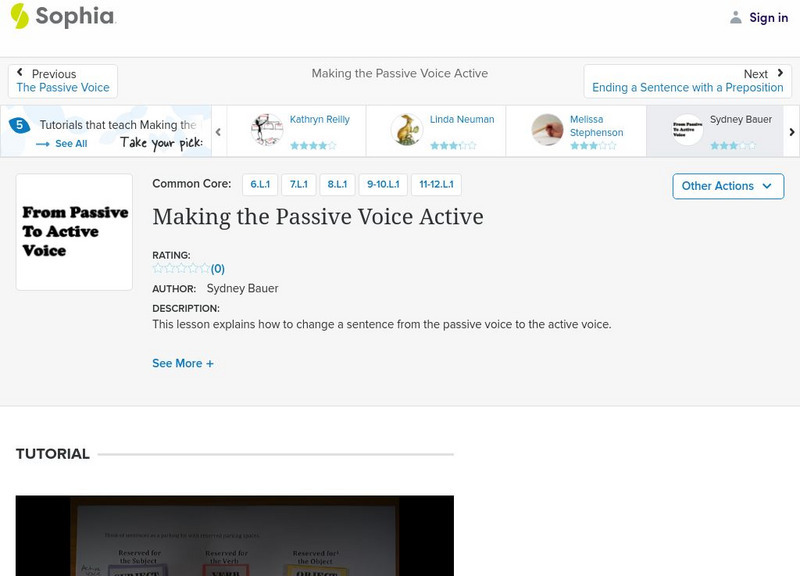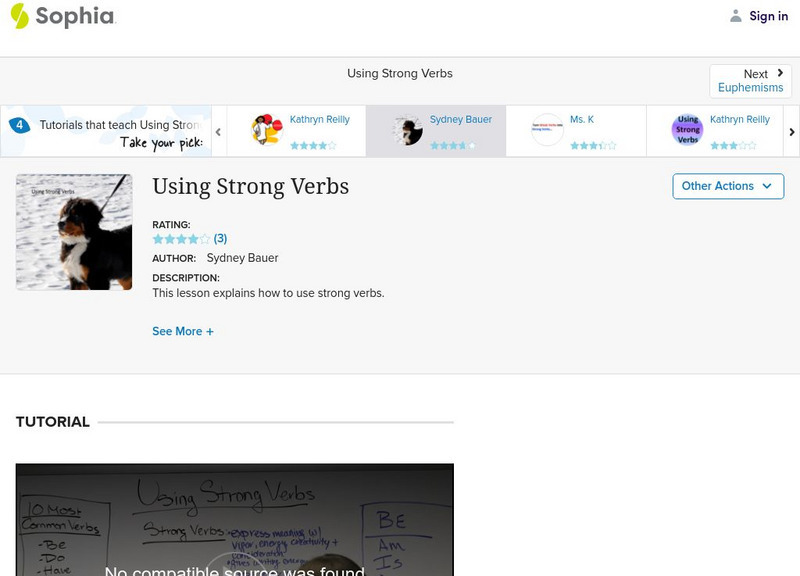Communication Coach Alex Lyon
Using Active vs. Passive Voice when Storytelling
The best storytellers speak in an active voice rather than a passive voice. Get some real-time practice and examples that show you how to turn passive sentences into active sentences and watch your stories transport your listeners.
Curated Video
How to Write an Information Report
An introduction to writing information reports. This video details the structure of an information report (introduction, body, conclusion, bibliography) as well as the language features used within an information report (present tense,...
Curated Video
Active and Passive Voice | Learn English
Learn the difference between active voice and passive voice as well as when to use the passive voice.
The Learning Depot
ADVANCED LESSON PART 1: How to Reduce the Adverb Clause
In today’s video we’ll continue with our lesson on Reduced Adverb or Adverbial Clauses. This is an advanced lesson so students will need to be familiar with the present and past participle as well as the perfect aspect of verbs. This...
The Learning Depot
The BE Verb: Be, To Be, Being, Been~All About Be
The BE verb is the most important verb in the English language. It communicates a state of being, or existence. The verb BE is used as a main verb as well as an auxiliary verb. It is a most irregular verb and has eight forms: be am are...
Curated Video
GCSE Secondary English Age 13-17 - Writing: Forms of Writing: Non-Fiction Part 2 - Explained
SchoolOnline's Secondary English videos are brilliant, bite-size tutorial videos delivered by examiners. Ideal for ages 13-17, they cover every key skill in English Reading and Writing that students need to master in clear and easy to...
Curated Video
How To Change Active Voice To Passive Voice
Learn the difference between active voice and passive voice, and then understand how to change active voice to passive voice.
Bill Carmody
Adapting to the Audience with Expert Writing Techniques
This video discusses the importance of knowing your audience, using the right tone, using simple language, writing in an active voice, addressing the audience directly, incorporating visuals, and using concrete examples and stories. It...
The Learning Depot
Active and Passive Voice of Verbs | English Grammar Lesson
Voice is one of the five properties of verbs. The voice of a verb determines whether the subject performs or receives the action. In today's lesson, you will learn about the two grammatical voices: active and passive. You will learn how...
Learn German with Herr Antrim
What are voices? - German Grammar Jargon - German Learning Tips #32 - Deutsch lernen
What is a voice? What is the difference between active and passive voices? How do you make the active and passive voice?
Curated Video
Using Passive Voice to Emphasize Action in Writing
In this video, the teacher explains the concept of passive voice and its purpose in writing. The teacher provides examples and prompts for the students to practice identifying and using passive voice. The video also emphasizes when and...
Curated Video
Active Voice vs. Passive Voice: Strengthen Your Writing
This video is a teacher-led lesson on active voice in writing. The teacher explains the difference between active and passive voice, provides examples, and guides students through identifying and correcting passive voice sentences. The...
Curated Video
Using Voice Effectively: Emphasizing the Actor or the Action
This video provides a clear explanation of how to effectively use voice in writing by switching between active and passive voices. It discusses the reasons for choosing one over the other and provides examples to illustrate each case.
Curated OER
Active Voice and Passive Voice
Identify the subject of the verb and the agent (whatever is doing the action), and you will be able to discern if your sentence is written in the active or passive voice. Yossarian the Grammarian demonstrates by writing examples of each...
Sophia Learning
Sophia: Making Passive Voice Active
This screencast explains when and why to use active voice and passive voice in writing and how to change from one voice form to the other. It also includes links to additional web resources for changing voices. [3:08]
Sophia Learning
Sophia: Making the Passive Voice Active
This video lesson focuses on changing passive voice sentences into active voice. It begins by asking students to think of sentences as a parking lot with reserved spaces for parts. It shows active voice sentences as SVO order and passive...
Sophia Learning
Sophia: The Passive Voice
This screencast [2:25] defines passive voice, offers reasons for its use, explains how to write using it, and provides examples throughout. It also offers links to more information about passive voice.
Sophia Learning
Sophia: The Passive Voice vs the Active Voice
This screencast focuses on voice including the difference between active and passive voice, why active voice is preferred, and when it is acceptable to use passive voice. Links to more resources are also provided. Real Player is required
Sophia Learning
Sophia: Emphasis: Using the Passive Voice: Lesson 2
The lesson discusses the passive voice. This lesson is 2 of 2 in the series titled "Emphasis: Using the Passive Voice." [3:53]
Sophia Learning
Sophia: Passive and Active Voice
A screencast lesson defining active and passive voice, demonstrating how to construct a sentence in passive voice, and explaining when using passive voice is appropriate. [16:14]
Sophia Learning
Sophia: Passive and Active Voice
An animated video lesson followed by notes and additional examples demonstrating how to write in the passive voice and when it would be appropriate to do so. [5:09]
Sophia Learning
Sophia: Using Strong Verbs
A video lesson defining a strong verb and explaining how to create strong verbs within a written text by changing passive voice to active voice, eliminating unnecessary qualifiers, and reducing phrases to a single word. [7:24]
Sophia Learning
Sophia: Punctuating Dialogue: Lesson 2
This lesson introduces the punctuation and formatting rules for conversations. It is 2 of 2 in the series titled "Punctuating Dialogue."
Sophia Learning
Sophia: The Passive Voice vs. the Active Voice: Lesson 2
A slideshow comparing passive active voice and discussing when each is appropriate. It is 2 of 5 in the series titled "The Passive Voice vs. the Active Voice."











